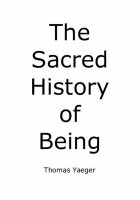Describe your desk
It depends on what I'm doing at the time. The basic kit is a laptop, printer, a jar of pens and pencils, and a radio/cd player. It is a gatefold table, and if I'm consulting a lot of books I will fold it out to accommodate them. In the winter there will be a lamp next to my desk.
Where did you grow up, and how did this influence your writing?
I grew up in Edinburgh, Scotland. It's a place which has had its fair share of writers. R.L. Stevenson came from Edinburgh, and wrote about dual or conflicted personality more than once, and the city itself is a bit like that. It has a dark side. So what you see often isn't the whole of what is there. How complicated things can turn out to be when you start to unpick them! I learned that while living in Edinburgh.
What's the story behind your latest book?
There are two stories about it. The argument of The Sacred History of Being runs counter to much modern speculation about the origins of philosophy. This isn't down to me being contrarian and vexatious for the sake of it, but because when you look closely at the evidence, the consensus model doesn't hang together properly. The book is both an analysis of what is wrong with our agreed picture of the origins of philosophy, and a preliminary attempt at a reconstruction of a history of the subject which is more likely, and which makes more sense of the evidence.
The second story is how I came to write the book. It started from very little things: I'd been interested in philosophy for many years, and was familiar with Plato and Aristotle, the Sophists, and Greek philosophy in general, I found in a book on Ancient Egyptian literature by the eminent German Egyptologist Adolf Erman, a translation of Akhenaten's Hymn to the Aten, which invoked the idea of completion. I was familiar with that idea from Aristotle, where the concept is a key part of his understanding of how the world is put together. But Aristotle belongs to the 4th century B.C.E. Akhenaten belongs to the *14th century* B.C.E. That's a thousand years or so of difference. How could this be?
That was the start of the project, though I had no idea at the time that I was already in motion, and no clue as to where the project would take me. I had no map. I ended up studying ancient history in London, in order to have a map. There is a story to be told about that. I've addressed part of that story already on my blog and in the course of the book, but a full account of the twists and turns on the way to the writing of The Sacred History of Being might be useful to other researchers who find themselves starting on something completely new.
What motivated you to become an indie author?
I wanted to cut out a number of filters that usually stand between writers and the public. I worked as a magazine editor for five years, and also contributed articles to a number of other magazines, So I know the importance of copy-editing. But I wanted to avoid editorial compromise with the structure and focus of the book I was in the process of writing. Taking the indie route gave me that level of control.
What is the greatest joy of writing for you?
Research. And figuring things out. A lot of things emerge from the act of writing up research. As D'Arcy Thompson pointed out, when you assemble pieces of information, they will tell stories about each other. So you find out things that you didn't know were there.
Who are your favorite authors?
In fiction: George Orwell; Hermann Hesse; Robert Graves; Lewis Carroll; and Frederik Pohl.
In non-fiction Michael Harrison (author of 'Fire from Heaven'.), partly for his style of writing, Thomas Kuhn (the Structure of Scientific Revolutions); Jean Seznec; Alan Watts; Cicero; and Carl Jung (particularly for his book on 'The Nature of the Psyche').
When did you first start writing?
I started to create small comics when I was at primary school. At secondary school as part of a project I wrote a thirty page essay about Rembrandt, and later for my own interest I wrote a gazetteer of the solar system, which was about fifty pages long. I remember also working with someone at school on a paper about statues in Edinburgh, which was fun to research. We found out how good the Central Public Library was as a resource for all things Edinburgh. There was other stuff too.
What inspires you to get out of bed each day?
Coffee.
When you're not writing, how do you spend your time?
Listening to music or watching movies, particularly film noir from the 40s and 50s. Cooking is a pleasure. Food and movies with friends.
Published 2015-11-19.
Smashwords Interviews are created by the profiled author, publisher or reader. Create your own interview!
Books by This Author

The Sacred History of Being by Thomas Yaeger
Price: $7.99 USD. Words: 113,510. Language: British English. Published: November 2, 2015. Categories:Nonfiction » History » Civilization, Nonfiction » Philosophy » Religious philosophy
Did the ancient Greeks invent philosophy, and the concept of Being? That has been the conventional wisdom for many years. In fact philosophy is very old, and its presence can be traced in other cultures in the Ancient Near East, at least as far back as the middle of the 2nd Millennium B.C.E. Thomas Yaeger explores the ancient cultural significance and context of philosophy before the Greeks.
No comments:
Post a Comment